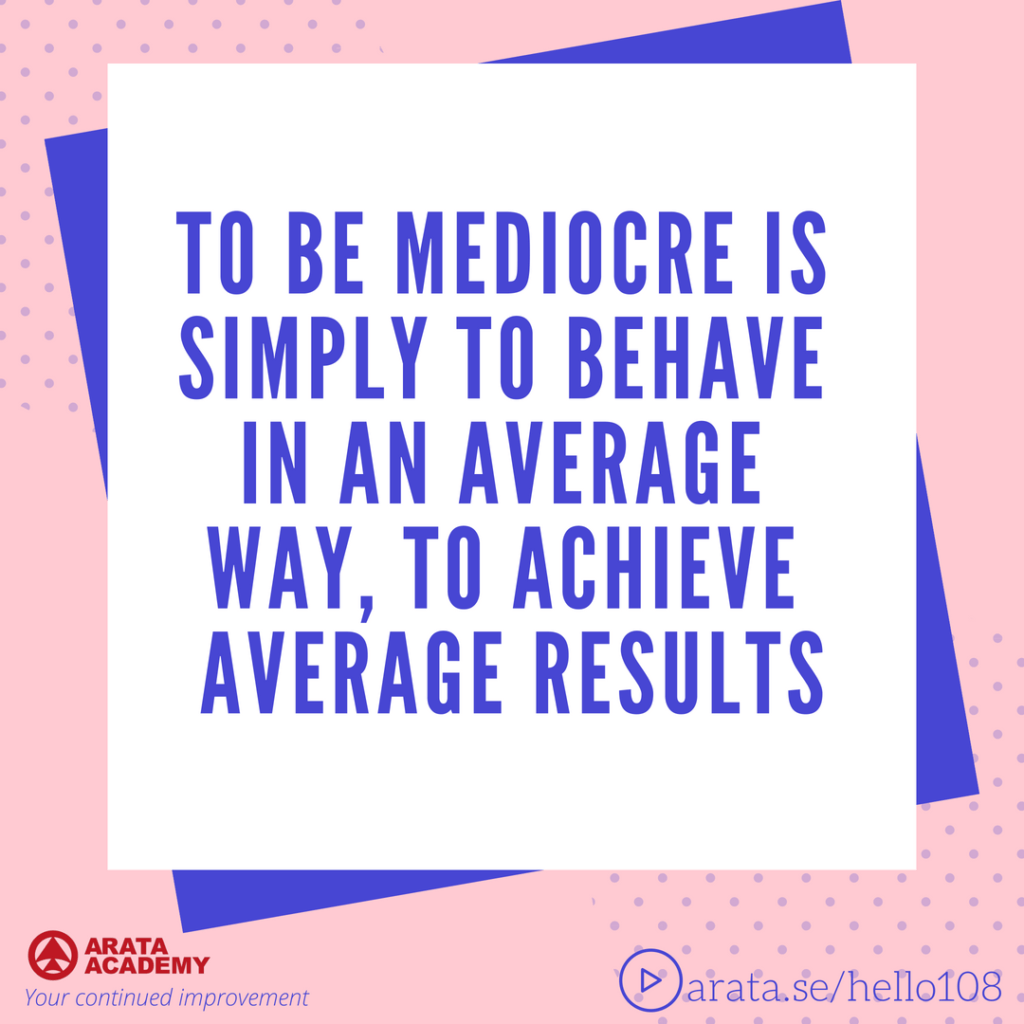Hello! Seiiti Arata. I have an invitation for you: decide now to leave the basic, the average, the regular. Get out of the culture of mediocrity.
1. Is mediocrity offensive?
Certain people are offended by the term ‘mediocrity’. They don’t understand the meaning of mediocrity. They may even think that it is an offensive term.
However, a visit to a dictionary would tell us that mediocrity means common, vulgar, ordinary, regular, staying within the average. To be mediocre is simply to behave in an average way and to achieve average results.
To be mediocre is to settle for what is possible instead of aiming for the best in areas that matter.
– Oh, but on the salary they pay me, there’s only so much you can do”. (First, do your job better than they expect you to, then ask for a raise)
– Oh, but I was short on time so I did more or less (so stop wasting time with bullshit and do it carefully with dedication)
– Oh, but no one gave me a step-by-step tutorial. No one taught me any different. (Teach yourself, read books, be humble enough to ask for help when you need it, volunteer to gain experience)

– Oh, I’m not going to push myself in this relationship because my partner doesn’t push him/herself. (Don’t wait for others to better themselves, be the best version of yourself right now).
It’s astonishing how many people would rather stay in the comfort zone provided by mediocrity than to force themselves to be better, to stay above average.
Instead of living, they are content with existing. Stones exist. Clouds exist. Insects exist. Mosquitoes exist. Those who truly live are solely human beings that choose to escape mediocrity.
Don’t confuse mediocrity with humility. Humility is a virtue. It’s being modest, it’s showing respect for the enormous possibilities and also for the enormous challenges ahead. You can start small, humble. And you can dream big, have big aspirations that lift you out of the culture of mediocrity. A mediocre person isn’t humble. A mediocre person doesn’t dream big.
Don’t confuse mediocrity with gratitude. Gratitude is the satisfying acknowledgement of what you already have, who you already are, and the acceptance that other possibilities exist ahead. You can be grateful for the present moment and also strive to make the future even better. A mediocre person isn’t grateful. A mediocre person loves to complain.
When we talk about mediocrity, we speak about cowardice, of avoiding challenges, of choosing to stay in your comfort zone.
Mediocrity is the refusal to seek growth. It’s being scared of everything. It’s the conformist and deterministic mind set of saying “oh, there’s no point because it’s just the way I am”. To say this is to assume that people never change, that they are static and that there is no possibility of growth or learning.
A mediocre person will also have difficulty in recognising and appreciating the effort and hard work that other people have put in in order to achieve a certain level of mastery in a certain skill.
If you were to speak with them about someone who could demonstrate improved knowledge or capabilities in certain areas, such as a great musician, an exceptional athlete, a brilliant scientist, someone who can speak about interesting subjects fluently in multiple languages, what’s the reaction of the person who behaves in a mediocre way? They will explain that it is all talent, luck, that it is something they’re born with, an innate attribute as pre-determined as eye colour. “She plays so well. She’s an Aquarius, so she’s a creative person.” “He’s good at sports, he must have been born with fire in the belly”. “She has a talent for speaking foreign languages”. However, there is no talent, there is only dedication, interest, study. There is effort. There are dedicated hours to a deliberate cause.
Is mediocrity offensive? Well, if you seek excellence, then mediocrity should seem slightly offensive to you and therefore you should refuse to make choices that keep you within the culture of mediocrity.
2. How do you get out of the culture of mediocrity?
There are four steps to getting out of the culture of mediocrity: will, price, reflection and action.

The first thing you need to do is awaken your will, your intention. You need to break the spell that imprisons you in the state of numbness and low consciousness. Most people that are in the culture of mediocrity don’t even know that they’re mediocre because they don’t have a vision of the impact they want to make, what they want to achieve, who they want to become. You need to imagine clearly, desire earnestly, and believe sincerely.
After you awaken your will, you must pay the price. Because to get out of the culture of mediocrity, you have to push yourself out of your comfort zone, and you have to stop being content with average results. It’s not easy, you will have to put in a lot of effort. You have to make a promise to yourself, a promise that you ACCEPT TO PAY THE PRICE to get out of mediocrity. If you don’t accept to pay the price, you will NEVER get out of mediocrity.
Think about the people you know and think about how: the average, mediocre person is the person who doesn’t want to pay the price. That’s why they’re content with having average results in what they do, whether that be in school or in a job where they do the bare minimum in order to not get fired. They now don’t make nearly half as much effort as they did in their relationship when they were chasing after their significant other, in the attraction phase. Now they’ve settled down.
Paying the price is also understanding that you’ll have to face situations that you don’t want to.
What happens when you start to excel at school or at work? People become envious, jealous.
This is the power of mediocre people, who act like a gang to put you down because they don’t want anyone to stand out. If you’re the kind of person that always wants to please everyone, you’ll never get out of the culture of mediocrity. The culture of mediocrity is like when you try to fly but someone has already cut off your wings.

Now that you have declared that you have the will and that you except to pay the price to get out of mediocrity, comes the part of reflection. Look at yourself in your current situation. Are you doing the bare minimum? Or are you doing your best? “Do your best” is a concept related to continuous improvement. This is what we aim to do on Arata Academy courses. Your continued improvement. Your best today needs to be better than it was yesterday.
Next up is the fourth part, which is action. Be careful! A lot of people will say “oh, I already knew all this.” Knowing is one thing, dedicating yourself to taking action every day is another.
Knowledge without practice won’t give you any results. You have to consistently look for something more. You have to do different things in order to achieve different results. You have to pay the price. You have to accept the discomfort. Incidentally, you have to actively seek the discomfort.
If it seems difficult, it’s not your fault. The way we have evolved has made us want to be comfortable and save energy. It is efficient to be relaxing. It is easy to look at photos of others online and to lose focus. So, to get out of the culture of mediocrity, I have to move away from the basic, I have to consciously make the additional effort to make better choices.
3. The challenge lies in the fact that it’s not easy to make better choices.
If our results are a consequence of our choices, just make better choices for better results. But it’s not always that easy. It’s not enough to just say that we want it.

Take, for example, the number of people who say that they want to live a great love, who marry making promises and who end up getting divorces. Consider the amount of people that work jobs that they hate. Forty hours a week (or more) of self-torture. The amount of people that say they want to have an athletic figure but eat badly and live a lazy lifestyle.
Why do we say that we want something but our actions don’t show it? Why do we say we want to leave the culture of mediocrity, but in the next moment, instead of investing in our improvement, we are wasting time on some other nonsense?
You must have met some people who say “I want to, I know what has to be done… but when it comes to doing it, I end up getting lost, confused, lazy, I end up leaving it until later and then forgetting”.
The people that have these types of problems need to raise their level of consciousness. Choices need to become conscious choices. You will find more in-depth training on this topic at https://arata.se/moneytaboo
For every type of choice we make, there are different types of outcome. There is an immediate level of outcome and then there are secondary levels, tertiary levels, and so on. For example: I am walking and step in front of a sweet shop. I can keep walking, or I can go in and eat some sweets. The immediate level of result is one of pleasure in eating the sweets. I have a tasty experience. But soon after I can feel guilty, remorseful. And if I make that a repeated habit, then in exaggerated situations, I could also gain weight, become obese, develop diabetes and other problems.
What if I were to ignore the sweet shop and instead, I were to put more effort into going to the gym? The immediate result may be sweating, tiredness, pain. But, in making this a repeated habit, I would have a healthier body and probably also a healthier mind and a more balanced life.
The immediate level is the one that is the most obvious to us. You need to have great clarity in order to recognise and appreciate results from other levels. When you can give attribution to all levels and consequences, then you can make a conscious choice. It’s not easy, but it’s possible with some training.
As always, we have saved the best until last. The final tip I’ll share with you is in the form of a story and has to do with our training. You can find this on https://arata.se/moneytaboo
Once upon a time, a young woman went to work in front of a house where a gentleman was sitting on the porch with a dog lying on his left side. The dog always looked sad and moaned in pain. Every day, when she passed his house, she would see the same scene: the old man sat on his porch and the dog whimpering to his left.
One day, the girl could not take it any longer and decided to intervene. She asked the old man,
“Do not you realise that your dog is suffering?” Why does he moan every day?
The old man replied:
“The floorboards to my left are loose and the tips of the nails poke out from the boards. The dog ends up lying on them and then starts to whimper.”
Then, the girl asked:
“So why doesn’t the dog lie on the right side?”
The man then revealed the reason:
“It’s because it’s not hurting enough for him to move.”
Do not let mediocrity lead to disaster.
You know exactly what is not right in your life. The problem is that the pain is not yet strong enough for you to do something about it.
Don’t wait until life becomes unbearable before you take action. Make a change now. We have an exclusive series of videos on this topic, that you can access by visiting https://arata.se/moneytaboo

